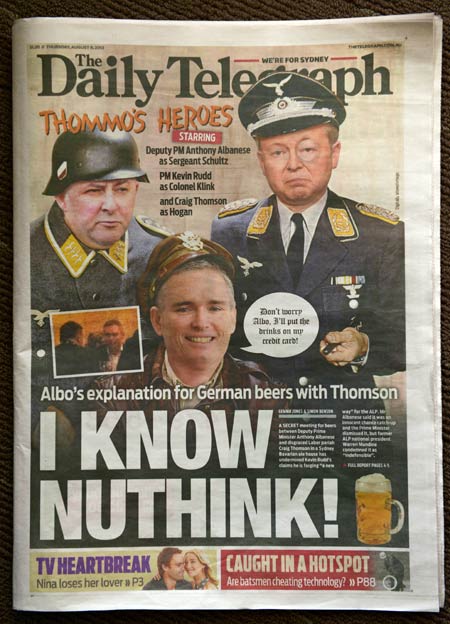Social media counters Murdoch papers
|
 |
|
The front page of Rupert Murdoch's key tabloid, the Sydney Daily Telegraph, depicts Australian Prime Minister Kevin Rudd (right) on Thursday in a digitally altered image as the bumbling Nazi TV character Colonel Klink from the hugely popular 1960s US television comedy series Hogan's Heroes. Gregwood / Agence France-Presse |
Australian Prime Minister Kevin Rudd is battling not only jaded voters in a bitter election race, but the rancor of Rupert Murdoch, whose newspapers have depicted Rudd as a fictional bumbling Nazi colonel to a thief stealing the nation's savings.
The Australian-born Murdoch's crusade to oust Rudd in the Sept 7 general election has given rise to a heated social media campaign inside a campaign, as Twitter, Facebook and other digital platforms become the weapons used by some to try to outflank Murdoch's "old media".
As the campaign kicked off last week, Murdoch's best-selling Daily Telegraph tabloid urged readers to "Kick This Mob Out" over a picture of Rudd at Parliament House.
In another front page from Murdoch's News Corp stable, Rudd and Deputy Prime Minister Anthony Albanese were shown as the hapless Nazi officers from the 1960s Hogan's Heroes television show, while another greeted a high-profile recruit to Rudd and Labor's center-left cause with the headline "Send in the Clown".
In the finely poised western Sydney seat of Parramatta, Julie Owens, a member of Parliament for Rudd's Labor party, says the influence of the Murdoch press is hurting, with the billionaire's papers having adopted an even more confrontational stance than in past years.
"People aren't as aware of what we have done, and they can't judge us as a government," Owens said. "They can only judge us as a reality TV show - who is evil, who is bad, who is hard done by - and that's what the news has become."
Exactly what Murdoch's motivations are have been much debated.
Many people think Murdoch is using his 70 percent grip on big-city newspaper sales to protect the dominance of his prized cable TV investments from emerging digital media threats, chiefly a publicly funded $34 billion super broadband network championed by Rudd.
Murdoch lent credence to that theory, taking to Twitter to criticize "Oz politics!" and question how the cross-continent broadband - which the conservative opposition wants to scale back in cost and scope - could be paid for in Australia's AAA-rated but slowing economy.
"News Corp hates the government's National Broadband Network. The company has formed a view that it poses a threat to the business model of by far its most important asset in Australia, the Foxtel cable TV monopoly," wrote columnist Paul Sheehan for the rival Fairfax newspaper group.
Telecommunications analysts don't doubt Labor's NBN, rolling fiber cable into almost every home, threatens Murdoch's most important Australian asset, Foxtel, jointly owned with phone giant Telstra and near unchallenged in pay TV.
"Broadband, in general, undermines the business model that Foxtel and others have, where you have to buy a package of programs that you don't want, and 90 percent of which is rubbish," said telecommunications analyst Paul Budde.
But the 82-year-old, who has earned the nickname the "Sun King", also appears to be favoring conservative politics as he has done in Britain and the United States, while reinvigorating an Australian political war that dates back as far as 1975 and the dismissal of then-Labor prime minister Gough Whitlam.
Back then, Murdoch oversaw coverage that was seemingly so one-sided in favor of opposition conservatives, and controversial, that his own journalists went on strike.
Social network
Rudd has also fought battles with Murdoch's papers over ultimately false accusations of political favors supposedly done in 2009 for a car dealer friend, and again over ill-fated attempts to tighten Australian media regulation following phone-hacking scandals in Britain.
Rudd has responded to the Murdoch push against him with a heavy reliance on social media, including announcing the start of the election campaign over Twitter, where he regularly messages and posts photos.
Labor has recruited three digital media heavyweights from US President Barack Obama's 2012 campaign team, including British spoof video expert Matthew McGregor and Tom McMahon, dubbed Obama's "digital attack dog".
McGregor has helped create slick What we do now videos, calling for volunteers and telling digital savvy voters that "right now, it's 50/50" and "stopping Tony Abbott starts now".
Abbot is the opposition leader hoping to replace Rudd as prime minister.
Although all parties are using social media extensively, Ed Husic, Rudd's broadband minister, said the new platforms were helping counter the impact of the Murdoch media.
"Social media has been transformational, it's enormously positive. It's allowed MPs to talk about issues of importance to them and their communities that it has been difficult to do so previously," Husic said while campaigning in his western Sydney electorate.
Which approach works best may be decided on Sept 7, but a week into the campaign, support for Labor is slipping, especially in Sydney's crucial western outer fringes, where the slowing economy, jobs and immigration are flashpoint issues.
The conservative opposition led by Abbott has picked up 2 points since the campaign began in earnest, according to the latest opinion poll from Neilsen in Fairfax newspapers, mirroring other major surveys.
However, there is also a sense that neither the political parties, nor those like Murdoch agitating on the sidelines, are getting through to many voters, by new media or old, with some analysts tipping a record protest vote despite Australia's compulsory voting system.
Reuters


















